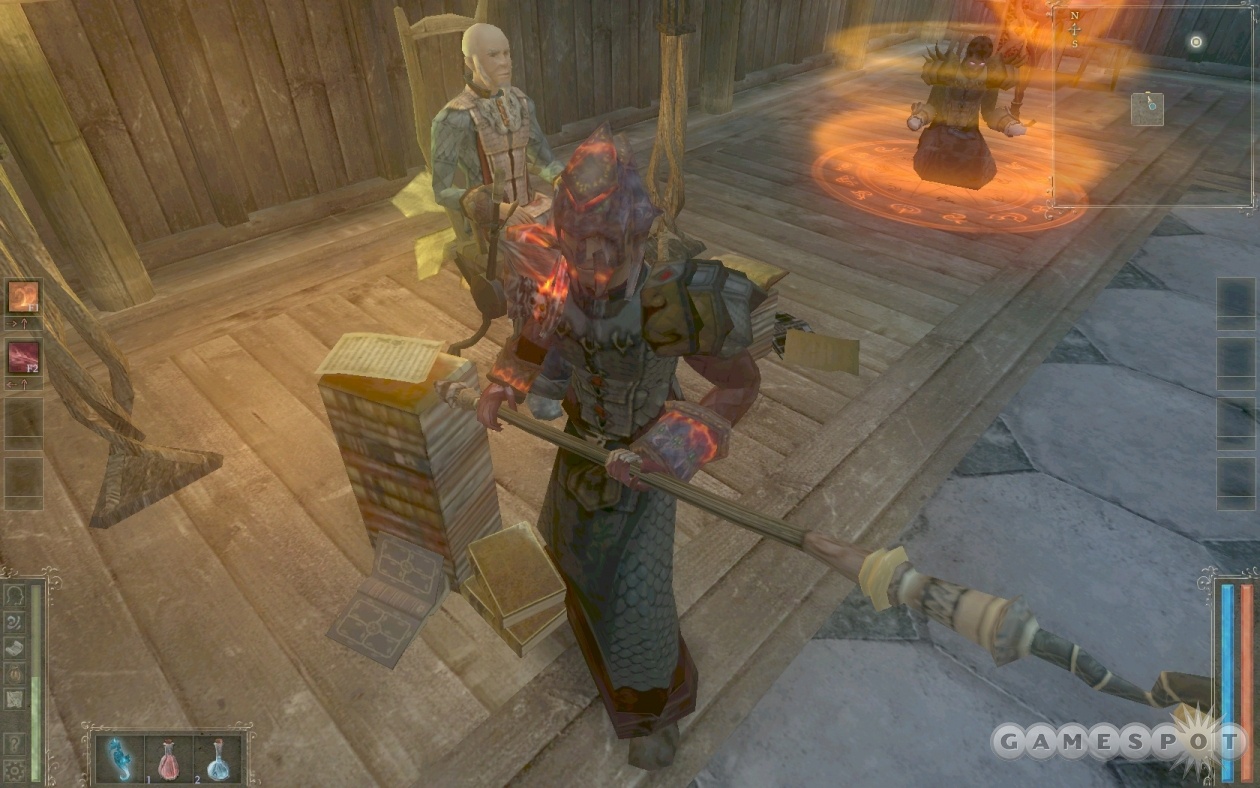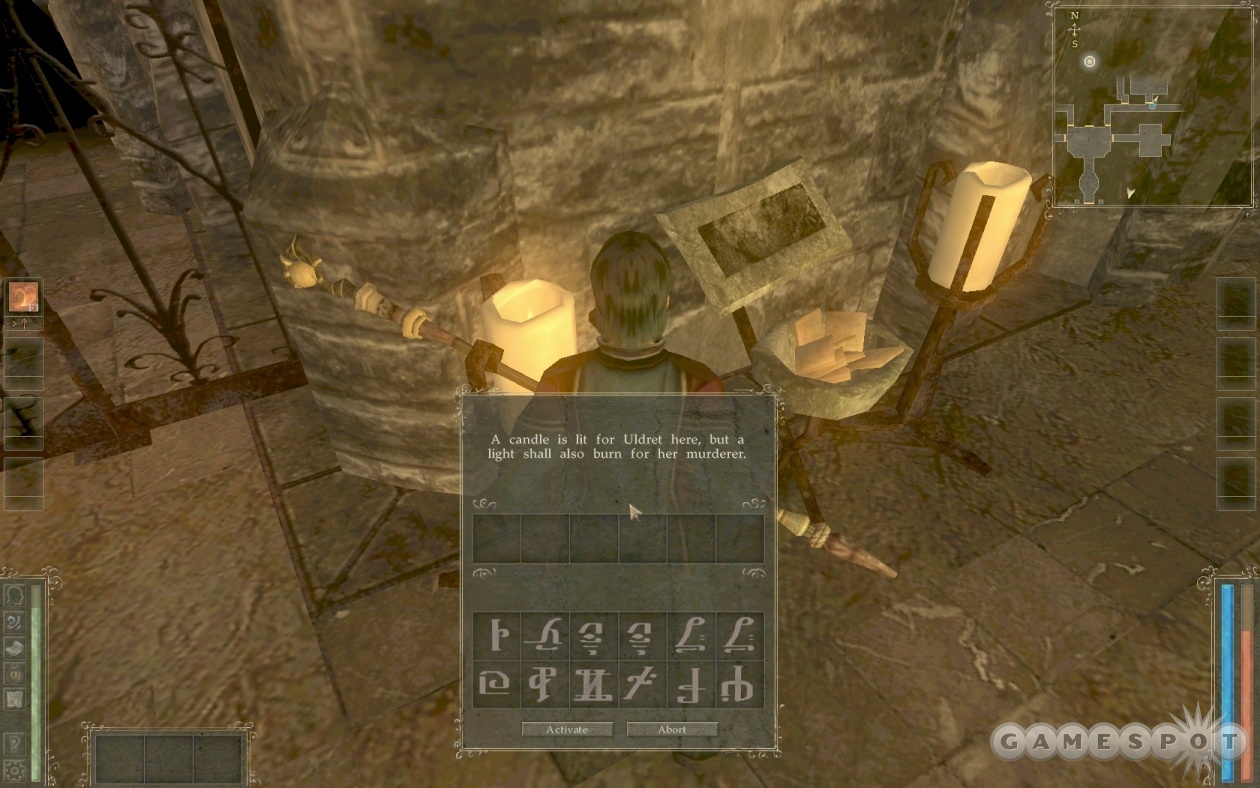Describing Avencast: Rise of the Mage is a bit tricky. This role-player relies on WASD controls, but it doesn't have the nonstop action of a typical action role-playing game. Quests feature standard go-fetch objectives, although they're often jazzed up with adventure game puzzles. And while the plot strays into world-saving Dungeons & Dragons clichés, it begins with a bored teen mage doing the Hogwarts thing. With so much cross-genre experimentation, it's difficult to figure out what the developer was trying to get at, although the one thing you can say is that this grab bag of RPG styles comes together remarkably well.
The look and feel of Avencast are pretty similar to that of the original Neverwinter Nights. ClockStone started developing the game four years ago, so it has something of an old-school vibe. This is most notable in the visuals, which are a bit chunky for a modern game. Character and monster models are burdened with boxy features, the animations are just a touch robotic, and most quests take place in run-of-the-mill dungeon corridors. Nothing here is particularly ugly, just uninspired. Outstanding colored lighting at least gives most scenes an eerie glow, a mood enhanced by the often creepy musical score.

Story is par for the course for a traditional role-playing game. You play a young wizard studying at the magical academy of Avencast, sort of a Hogwarts rip-off set in the usual D&D-style fantasy world. There is very little in the way of initial character creation. You just type in a name and go at it, later using skill points from leveling up to augment traits and select spells. The Harry Potter atmosphere is limited to the opening chapter of the game, too. The tale slides headfirst into derivative territory about saving the world from demons right after you prove your wizardry skills by clearing out a crypt and run errands for a few select professors. At least the voice acting is adept for a non-English game (ClockStone is based in Austria), and considerable storytelling flair has been added through the dramatic, sepia-toned artwork used in cutscenes.
Given all of the above, you would expect Avencast to play like the usual dungeon crawl. But here's where the game takes a little walk on the wild side. For starters, combat has been enhanced with dodge maneuvers. Instead of click-killing all of the skeletons, ghosts, giant crabs, golems, and other beasties that the game throws at your humble mage, you roll and tumble through battles with double-presses of the WASD keys. Most enemies have ranged attacks, too, and do a lot of damage in short order during melee combat, which prevents you from playing Conan and hacking your way through the monstrous mobs. Instead, you generally bounce around like an acrobat, avoiding projectiles like flaming skulls and boulders while ripping off magical bolts of your own with the right mouse button.
Your arsenal is augmented with spells from three magical schools. Blood, soul, and summoning spells can be bought with the skill points earned each time you level up, and then employed in battle through the use of key combos. Some of these combinations are pretty tricky, although the less arcade-inclined can skip the whole procedure and just map specific spells to single keys. No matter how you choose to cast them, spells in the main blood and soul categories don't differ all that much. Blood magic is more down and dirty, with spells that force you into melee-style combat, and soul magic is more about killing from long-range, but most of the spell effects are the same. Also, you're a mage, not a warrior, so staying out of harm's way and avoiding heavy melee combat is a necessity for much of the game no matter which magical ability you select.
Combat can be a bit on the tedious side even with all the leaping about. Monsters are generally pretty tough to kill unless you take big risks and get close enough to hammer them with a melee weapon (generally a magical staff of some sort, depending on where you are in the game), so it's easiest to stay away and snipe at baddies with the rather wimpy right-mouse attack. Ensuring victory comes at a cost of really slowing the game down, though. Killing many creatures in the game takes a good two dozen clicks with the right mouse button. Even the more powerful spells have to be cast many, many times before most beasties die. Some compensation is made for this through a reduction in overall enemy numbers, as you don't battle anywhere near the number of monsters you face in action RPGs like Diablo and Titan Quest. Still, getting bogged down in one lengthy battle after another really kills the momentum of quests at times.
Odd interface issues don't help much, either. Walls and landscape features frequently block your view during combat. The camera can be moved pretty easily, or set to automatically follow your back, although battles are so fast-paced that it sometimes feels like you're duking it out with the camera instead of dungeon denizens. Movement with the WASD keys is also an acquired taste, as your character always faces in the direction of the mouse cursor. Once you get used to this idea, you can really whip your mage around in battles. But it's awfully annoying for the first couple of hours, as no other RPG combines the mouse and keyboard functions in quite this fashion. Slight hesitations also get in the way of combat maneuvers. You can't immediately go from firing a right-mouse-button bolt to a drop and roll, so you have to account for a brief pause when going from attacking to dodging. Again, this isn't a big deal once you get used to it, but it can get in the way of conducting fluid battles at first.

Heavy reliance on riddles helps lift this minor monotony. Every dungeon in Avencast is loaded with brainteasers both big and small, so it feels like you're engaged in a more momentous task even when you're really just playing delivery boy or killing a boss monster. You gather the runes needed to complete the inscription on a shrine; tread carefully across platforms labeled with letters and symbols that must be activated in a specific pattern; weaken invulnerable creatures with beams activated by manipulating telescopes. Many dungeons have an adventure game-lite vibe. None of the puzzles are all that difficult, although each requires just enough thinking that you can't sink into the typical action RPG stupor that resembles something akin to a hypnotic state. You're not handed solutions, either, which means you often have to experiment with levers and the like instead of just reading books and scrolls as in so many other RPGs. If anything, the many riddles serve to more thoroughly immerse you in the gameworld and make the game feel like more of a traditional RPG epic than a hack-and-slash, despite the arcade-oriented combat.
Although Avencast: Rise of the Mage hit stores with barely a whimper last fall, it deserves more attention. Some of the combat and interface problems keep the game from reaching classic status, but it's still an entertaining and often innovative take on RPG subgenres that will reward any role-playing fan who seeks it out.